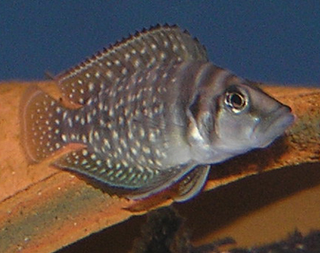
Cumulonimbus is a dense, towering vertical cloud, forming from water vapor carried by powerful upward air currents. If observed during a storm, these clouds may be referred to as thunderheads. Cumulonimbus can form alone, in clusters, or along cold front squall lines. These clouds are capable of producing lightning and other dangerous severe weather, such as tornadoes and hailstones. Cumulonimbus progress from overdeveloped cumulus congestus clouds and may further develop as part of a supercell. Cumulonimbus is abbreviated Cb.

Publius Cornelius Scipio was a general and statesman of the Roman Republic and the father of Scipio Africanus.

Uakari is the common name for the New World monkeys of the genus Cacajao. Both the English and scientific names are believed to have originated from indigenous languages.

The gens Licinia was a celebrated plebeian family at ancient Rome, which appears from the earliest days of the Republic until imperial times, and which eventually obtained the imperial dignity. The first of the gens to obtain the consulship was Gaius Licinius Calvus Stolo, who, as tribune of the plebs from 376 to 367 BC, prevented the election of any of the annual magistrates, until the patricians acquiesced to the passage of the lex Licinia Sextia, or Licinian Rogations. This law, named for Licinius and his colleague, Lucius Sextius, opened the consulship for the first time to the plebeians. Licinius himself was subsequently elected consul in 364 and 361 BC, and from this time, the Licinii became one of the most illustrious gentes in the Republic.
Gaius Licinius Macer Calvus was an orator and poet of ancient Rome.

The bald uakari or bald-headed uakari is a small New World monkey characterized by a very short tail; bright, crimson face; a bald head; and long coat. The bald uakari is restricted to várzea forests and other wooded habitats near water in the western Amazon of Brazil and Peru.

Birds of Prey is a novel by science fiction / fantasy author David Drake, first published in 1984. It is related as a historical novel set in the late Roman Empire, in the second half of the Third Century. There is a science-fictional twist to the story, starting with hints of a time warp on the very first page and slowly revealing to the reader — and the protagonist — what is really going on behind the scenes. The story is told in a very vivid style, suggestive of cinematography.

The southern bald ibis is a large bird found in open grassland or semi-desert in the mountains of southern Africa. Taxonomically, it is most closely related to its counterpart in the northern regions of Africa, the waldrapp. As a species, it has a very restricted homerange, limited to the southern tips of South Africa in highland and mountainous regions.

The red-headed vulture, also known as the Asian king vulture, Indian black vulture or Pondicherry vulture, is an Old World vulture mainly found in the Indian subcontinent, with small disjunct populations in some parts of Southeast Asia.

Altolamprologus calvus is a cichlid endemic to the southern shoreline of Lake Tanganyika in eastern Africa. The species has an extremely laterally compressed body and a high dorsal fin. Males may grow to 13 cm (5 inches), while females are normally smaller.

Cumulonimbus calvus is a moderately tall cumulonimbus cloud that is capable of precipitation but has not yet reached the tropopause, which is the height of stratospheric stability at which cumulonimbus forms into cumulonimbus capillatus (fibrous-top) or cumulonimbus incus (anvil-top). Cumulonimbus calvus develops from cumulus congestus, and its further development, under auspicious conditions, will result in cumulonimbus incus.

The coleto is a starling species in the monotypic genus Sarcops. It is endemic to the Philippines. Its natural habitats are subtropical or tropical dry forest, subtropical or tropical moist lowland forest, and subtropical or tropical moist montane forest. In Central Visayas, this bird is commonly known as the sal-ing.

The naked-faced barbet is a bird species in the family Lybiidae. It used to be placed in the family Bucconidae (puffbirds), which has been split up; alternatively, it may be included in a vastly expanded Ramphastidae (toucans).
Lucius Caecilius Metellus Calvus was a Roman statesman. He was a son of Quintus Caecilius Metellus and brother of Quintus Caecilius Metellus Macedonicus. First Calvus used to be a Praetor, later a Consul and Governor of Hispania in 142 BC, where he fought, without success, against Viriathus, then he became a Proconsul of Cisalpine Gaul in 141 BC, and from 140 BC to 139 he was a Legate. Also during those years, Calvus participated in an embassy to some Eastern states.

Sphaerexochus is a genus of trilobite from the Middle Ordovician to Late Silurian of Asia, Australia, Europe, and North America.
Caseolus calvus is a species of small air-breathing land snail, terrestrial pulmonate gastropod mollusks in the family Hygromiidae, the hairy snails and their allies.
Caliphis hickmani is a species of mite in the family Ologamasidae.

Indibilis and Mandonius were chieftains of the Ilergetes, an ancient Iberian people based in the Iberian Peninsula. Polybius speaks of the brothers as the most influential and powerful of the Iberian chieftains in that time period. Livy calls one of the chieftains of the Ilergetes "Indibilis", while Polybius gives "Andobales" for the same person. They agree that his brother chieftain was Mandonius.
Erigeron calvus is a very rare species of flowering plants in the daisy family known by the common names bald daisy or bald fleabane. It has been found only once, in a collection made in 1891 at the western foot of the Inyo Mountains near the community of Swansea in Inyo County.













